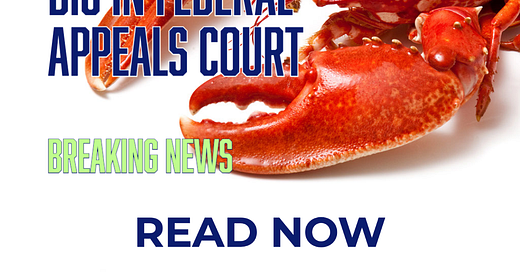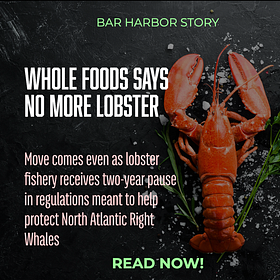WASHINGTON, DC—The Maine Lobstermen’s Association had a big win today in an appeal in a case against the National Marine Fisheries Service in the United States District Court for the District of Columbia.
The appeals had been argued in February. The association and others, including the Mills Administration, said that a National Marine Fisheries Service’s biological opinion, was unlawful. That opinion was released in May 2021.
According to a press release from Governor Janet Mills’ office last year, the plaintiffs had “argued that NMFS acted arbitrarily by failing to rely on the best available scientific information and by failing to account for the positive impact of costly conservation measures already adopted by the Maine lobster fishery. In its September 8, 2022 opinion, the U.S. District Court sided with NMFS against Maine lobstermen.”
That opinion was officially reversed today.
Senior Circuit Judge Douglas Ginsburg writes,
”We reverse the district court’s grant of summary judgment to the Service and direct the court to enter summary judgment for the lobstermen on count one of their complaint. Because the Service has raised no independent defense to count four of the complaint, we direct the district court to enter summary judgment for the lobstermen on count four. We further direct the district court to vacate the biological opinion as applied to the lobster and Jonah crab fisheries and to remand the phase one rule to the Service. Because our judgment gives the lobstermen all the relief they seek, we do not reach counts two or three of their complaint.”
The case stems from the National Marine Fisheries Service’s attempts to protect the North Atlantic Right Whale, which is endangered. In its biological opinion, the service determined that lobster fisheries kills right whales. The Maine lobster industry argued otherwise and that it has been taking steps to ensure that whales were not entangled in lobster fishing gear and that entanglements that have occurred can’t be proven to be linked to Maine.
The Service then enacted the Phase One Rule, which Ginsburg summarizes as
Both lobster associations and conservation groups ended up suing the government agency. The biological opinion was challenged as was the phase one rule.
Ginsburg writes,
“A few weeks after the district court ordered the Service to promulgate a new rule by December 9, 2024, the Congress enacted the Consolidated Appropriations Act.
“Pub. L. No. 117- 328, 136 Stat. 4459 (2022). Section 101(a) of Division JJ of that law provides: 14 [F]or the period beginning on the date of enactment of this Act and ending on December 31, 2028, the [phase one rule] shall be deemed sufficient to ensure that the continued Federal and State authorizations of the American lobster and Jonah crab fisheries are in full compliance with the [MMPA] and the [ESA]. Paragraph (a)(2) of § 101 requires the Service to promulgate new rules that take effect by December 31, 2028.’ The Act also appropriates money to accelerate the deployment of innovative (i.e., ropeless) fishing gear. Id. § 203(a)(1).”
Ginsburg determined that:
“The Service’s litigation position is inconsistent with the record….
“The Service’s change in position is arbitrary and capricious….
“The Service’s biological opinion is contrary to law….
“The Error Is Not Harmless.”
He further writes,
“This conclusion rests upon uncertain assumptions. Take the Service’s decision to allocate half the deaths of unknown origin and half of the undocumented deaths to U.S. fisheries. This allocation is of great importance to the analysis, but it has little empirical support. As shown in the chart above, most documented deaths from entanglement of known origin, particularly in recent years, have happened in Canada. Right whales have also migrated away from the Gulf of Maine. Moreover, before 2017, Canada did little to survey the Gulf of St. Lawrence, where many whales had relocated, so the dataset used by the Service may well understate the role of Canada in the decline of the right whale population.”
The industry suffered multiple blows this past fall and achieved successes in the court system last year. Some of those are detailed in the stories linked below.
LINKS TO LEARN MORE
Bar Harbor’s Lobster Tree Brings Support To Fishery
BAR HARBOR—There’s a new kind of tree up in Bar Harbor’s downtown this year. It’s not a Christmas tree or a holiday tree. It’s not a newly planted oak or pine or birch. It’s a tree made of wood and chicken wire and dozens of individually painted lobster buoys.
Many Locals Wearing Red To Support Lobster Industry
BAR HARBOR—Many locals are purposefully wearing red today to show their support of the lobster industry after the Monterey Bay Aquarium Seafood Watch lowered North American lobster to a “red/avoid” status because the industry may impact North American right whales on September 5.
Whole Foods Says No More Lobster
BAR HARBOR—While lobstermen may have received a two-year pause about new fishing regulations, the Marine Stewardship Council, a fishery sustainability group, is suspending Maine lobster fishery’s certification after the federal court decision that is meant to protect North Atlantic right whales.
New Restrictive Lobstering Rules Paused
PORTLAND—U.S. District Judge James Boasberg ruled yesterday that “new lobster fishing restrictions designed to conserve rare whales will be delayed until 2024 to give the government time to design them.” In July, a U.S. District judge determined that there needed to be stronger restrictions on lobstering in order to protect North American right whales,…
To see the decision in its entirety.












https://www.facebook.com/james.oconnell.549/videos/2624075124385193/
Ya hoo. Exactly the outcome I was hoping for.
My expose on what was going on in Canada and their subsequently following a map I sent them rerouting the cruise ships north saved most of the whales ending the Unusual Mortality Event. Their spot closures on the heavy gear crab fishery entanglements also saved a less critical amount of whales. In the last three years since the lane closure and crabbing fix there have been 0 deaths. Thank You Canada.
Then there was my Expose on NOAA ‘s ridiculous data speculation and mathematical graphing mistakes that the Maine Legislators or the Governor could not ignore.
It is past time for the Secretary of Commerce to give NOAA a new directive. Like leaving the lobster industry alone and taking the NARW off the Endangered Species List. Then working on some way to fertilize the crashing phytoplankton population that is decimating the
east Coast fin fishing industry.